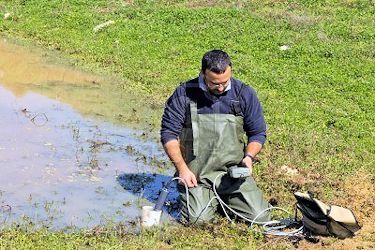RALEIGH – Saying they don’t need the money to meet their new mission, state environmental officials recently turned down almost $600,000 in federal grants. The money would have been used to set up a network of sites to begin testing streams in the Piedmont where natural gas production is likely to occur and to establish a long-term planning and monitoring program to protect wetlands.
The N.C. Division of Water Resources declined the two Wetlands Program Development Grants from the U.S. Environmental Protection Agency, though the state had applied for them and was notified in June that the money would be distributed later this year.
Supporter Spotlight
It’s the first time a state in EPA’s Southeast region has refused a grant since the program started in 1996, an agency spokesperson in Atlanta said. North Carolina could be the only state in the country to ever decline the grants.
The state decided to turn the money down, noted Tom Reeder, the division’s director, because it isn’t needed to meet the division’s revamped mission set out by its new boss, John Skvarla.
 John Skvarla |
 Tom Reeder |
Appointed by Gov. Pat McCrory, Skvarla this year took over as head of the N.C. Department of Environment and Natural Resources, or DENR. Reeder’s division is part of the department.
“Secretary Skvarla has emphasized on numerous occasions since he arrived at DENR that the department will diligently comply with both the letter and spirit of all federal and state laws, regulations and mandates that the division is tasked to implement,” Reeder explained. “Quite simply, the grants were not needed for the division to meet our core mission. We will diligently meet our mandates under state and federal law, and these grants aren’t needed to do that. We’re simply slimming down.”
Critics, however, note that the almost $223,000 grant to collect basic water-quality data in streams in the central Piedmont where hydraulic fracturing, or fracking, for natural gas could take place was a recommendation in the department’s 2012 study of gas and oil production in the state.
Supporter Spotlight
“Not doing that is falling through on what was a key recommendation in that state report,” said Robin Smith, who left DENR as an assistant secretary after McCrory’s election last year. “Collecting that sort of baseline data has wide support on the new energy commission and in the legislature.”
The grant would have set up a network of testing sites to collect information, such as water temperature, pH and chemistry, and to survey the animals that live in the streams before fracking occurs, explained Peter Benjamin, the field supervisor for the U.S. Fish and Wildlife Service office in Raleigh. The service, the U.S. Geological Survey and the N.C. Department of Transportation were partners with the division in the grant.
“The intent was to get better baseline information so that we can anticipate the negative developments that could occur and better assess those effects and plan a better response to them,” Benjamin said.
He said he was surprised when he learned that the state had turned the grant down. “We just learned about it and we have not gotten any information about any of the circumstances behind the decision,” Benjamin said late last week. “We still want the work to be done, but we’ll have to regroup and find some other avenue of funding.”
Reeder noted that the N.C. Division of Energy, Mineral and Land Resources, another DENR division, will devise fracking rules.
“My current understanding is that the comprehensive rules package that will allow fracking in N.C. will require the permittee to develop baseline groundwater quality data in the area where their fracking is to be conducted, before they are allowed to commence their operations,” he wrote in an email. “So that serves to further illustrate my point that these grants were not needed for the division to be able to perform its core mission.”
 Molly Diggins |
The fracking grant, though, would have established a network to test the quality of streams, rivers and other surface waters and not set up underground sites to monitor groundwater.
Turning down the fracking grant fits a disturbing pattern, noted Molly Diggins, state director of the N.C. Sierra Club. “This is just the latest example of what appears to be an intentional effort to starve DENR of resources,” she said. “This fits into a pattern where the administration and the legislature seem to continually hamstring the agency from doing its job. Now, the McCrory administration has turned down funding that would help communities facing fracking to get information about water-quality impacts.”
Declining the almost $360,000 for wetlands planning and monitoring means the end of a program that allowed the state to meet its obligations under federal law to protect wetlands, said John Dorney, who started the so-called Program Development Unit in the mid-1990s and retired two years ago after more than 30 years in state government.
The program subsisted mostly on these EPA grants, having gotten at least two dozen of them totaling about $10 million. It used that money, Dorney said, on a variety of projects that provided the science and technical assistance for the state to better protect its wetlands. He provided a long list of program accomplishments, which to the uninitiated sound wonky and esoteric. A sampling:
- Determining the regulatory success of wetland, stream and buffer mitigation
- Development of a database to track mitigation sites
- Stream mapping
- Developing and refining wetland monitoring protocols
- Mapping and assessing isolated wetlands
- Training field staff
It all sounds rather dull, Dorney knows, but he said almost all the projects gave the state the science and technical expertise needed to protect its wetlands. “Most things were integral to make sure that we had the policies in place and the standards in place for the wetlands program,” he said. “The whole purpose of the group was to apply research to figure how to improve the wetlands.”
 A scientist sets up monitoring equipment in a wetland. Photo: EPA |
Dorney’s shop was highly regarded by EPA, the agency spokesman noted, and many of its projects were held up as models for other states to follow.
The new grant was to put the unit on firmer, longer-term, financial footing, but it will disappear when two existing EPA grants are completed in the next year or two, Reeder said. The six employees working in the program, he said, have been or will be offered new jobs within DENR.
Refusing the grants doesn’t mean the state is reneging on its responsibilities to protect wetlands, Reeder emphasized. ” I can say without a doubt, that the State of North Carolina did not need to accept and execute either of the federal grants that we recently returned to EPA in order to continue to … adequately protect wetlands within the state,” he wrote in an email. “That is why the grants were returned.”
Reeder will find it hard to meet that pledge without the type of applied science and expertise that the wetland program provided, said Dorney, who is rather philosophical about the death of his professional life’s work.
“I was around for many changes in governors. Every time there’s a change in governors, there’s a change in policy. That’s democracy. So I don’t’ take offense to a change in policy,” he said. “The bigger issue is to take applied science and make the programs better. That’s not going to happen now. How are the programs going to improve? No one will be doing the science and planning to make that happen.”







